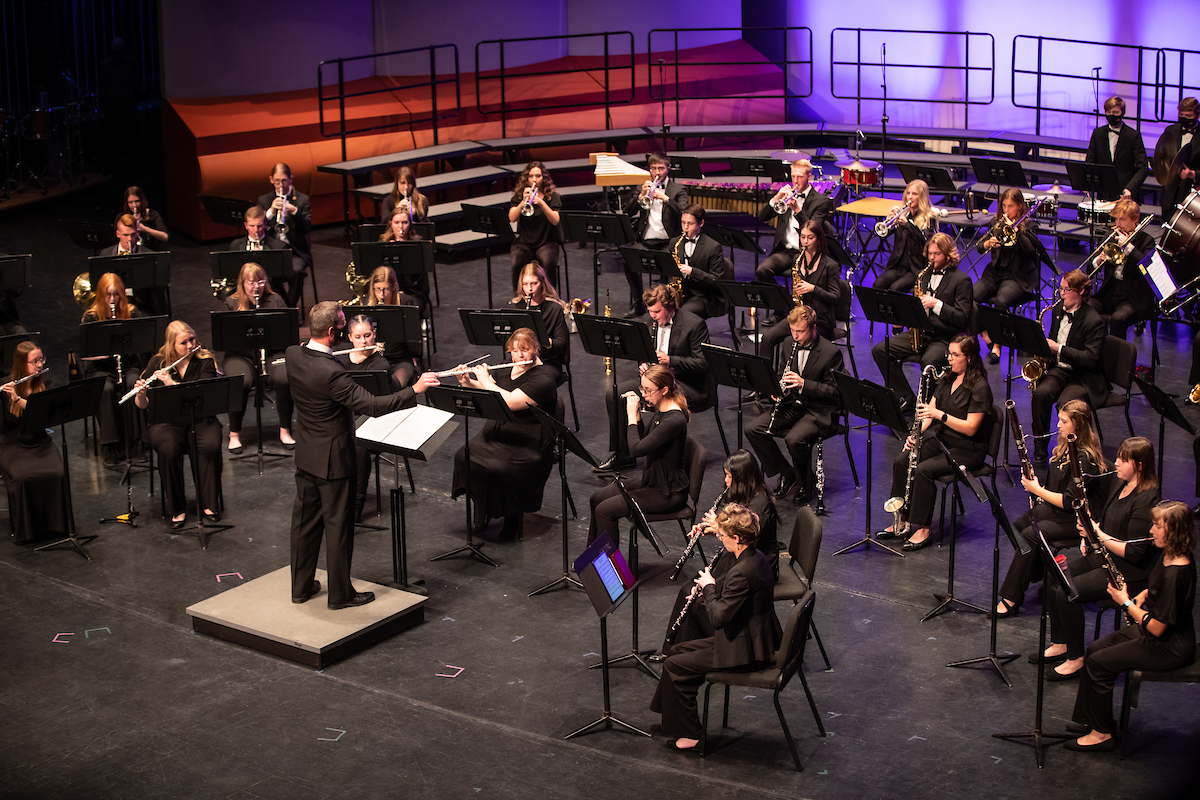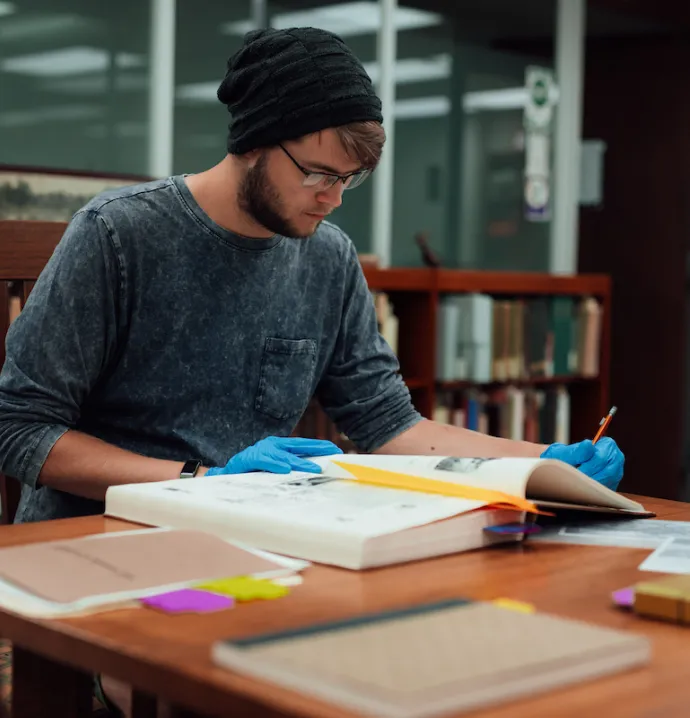School of Music showcases diverse composers and artists through Amplify Inclusivity initiative
School of Music showcases diverse composers and artists through Amplify Inclusivity initiative
 When the University of Northern Iowa School of Music learned another school had designated a “year of inclusivity” in their music department, the faculty were inspired — not simply to emulate the format but to create an even broader initiative that highlighted underrepresented composers and that could potentially extend beyond a single academic year. The result of this inspiration is the Amplify Inclusivity initiative.
When the University of Northern Iowa School of Music learned another school had designated a “year of inclusivity” in their music department, the faculty were inspired — not simply to emulate the format but to create an even broader initiative that highlighted underrepresented composers and that could potentially extend beyond a single academic year. The result of this inspiration is the Amplify Inclusivity initiative.
“For many years, our School of Music has made an effort toward inclusivity in our programming and in our guest artists,” said Stephanie Ycaza, instructor of tuba and euphonium. “So this isn't exactly a new thing. But the promotion is new and we’ve decided to prioritize inclusivity a little bit more in various areas of the School of Music.”
Conversations about a department-wide inclusivity initiative began in fall 2021. After some brainstorming, Ycaza was selected to lead the initiative by School of Music Director Jeffrey Funderburk and planning meetings kicked off in spring 2022.
Ultimately, the School of Music faculty members decided to showcase inclusivity in three primary ways: curriculum, programming and guest artist visits. In all three areas, performers and composers who are Black, Indigenous and people of color will be highlighted, as will LGBTQ+ and gender-diverse performers and composers. On the curriculum side, Ycaza said that composers of diverse backgrounds will be discussed in various School of Music classes.
When it comes to programming such as recitals or ensemble performances, Ycaza said that the music of diverse composers who are underrepresented in the field of music will be selected.
By featuring more diverse composers, the School of Music has often been highlighting contemporary, living composers. One of the exciting results of this new focus has been that sometimes these composers have actually been able to tune into live streamed performances of UNI ensembles playing their work.
Ycaza is excited to see Amplify Inclusivity impact what guest artists are brought to UNI.
“We prioritized a diverse group of voices coming in to interact with our students,” said Ycaza. “So that includes not only our guest recitals, but also our guest speakers, guest masterclasses and things like that.”
Ycaza pointed out the initiative is not about downplaying the classics, like Beethoven or Bach, but rather about updating and broadening the definition of “standard repertoire.”
“Part of this initiative is also programming music simply because it's good music and bringing in guests because they are good performers or good speakers and because we want to expose our students to that,” Ycaza explained.
Another way the Amplify Inclusivity initiative is taking shape is by reviving the George Walker Society of Music on campus. Named for famed African American composer and musician, the George Walker Society of Music served to elevate the music of Black people. The group became inactive during the pandemic. With this new evolution and a new name, All Voices Heard, the group plans to reconvene, expand its mission and give voice to a more multicultural and underrepresented experience in music.
“It's really important that you are able to see people who are like you doing things that you want to do,” says John Chiles, faculty advisor to the group “Clubs like this enable you to understand that you can be the change that you actually want to see.”
David Phetmanysay, who is a senior majoring in music performance (instrumental), has agreed to serve as the first president of the group.
“I am very excited about how All Voices Heard in Music will give underrepresented and minority (plus allied) music students an opportunity to feel empowered and create connections through shared difficulties as students within the program,” said Phetmanysay. “This social club will tackle a significant issue within music, and I hope that underrepresented students are finally being given a chance to feel like they rightfully belong in a demanding field of study.”
While right now Chiles is focused on raising awareness and recruiting students to the group, he hopes to see the group putting on concerts during Black History Month, Pride Month, National Hispanic Heritage Month and other times used to celebrate the heritage of marginalized groups. Chiles also hopes to have a fundraiser that will allow the group to provide scholarships to marginalized groups.
“Especially in the music world and with music history, a lot of our education is based on Western European culture, and that doesn't represent the entire world,” said Chiles. “If we are going to be an inclusive university, it is our job as faculty members and staff members or students to really learn about a diverse array of the world.”
Chiles said you don’t have to be a music major or even play an instrument to join the group, which will meet on the second Monday of every month in Gallagher Bluedorn room 30. Students who are simply interested in music of all cultures can join.
While Chiles knows there is still work to be done on campus — transformation he hopes All Voices Heard will help with — he is adamant the School of Music is a very special place.
“The School of Music is the reason I came to UNI instead of going to a conservatory in the northeast,” said Chiles. “I could be in Virginia right now. But there's something special about the School of Music here. So if we can continue to build upon this entire community through the arts, then it's only going to get better.
Ycaza echoes the specialness of the School of Music, something she’s felt from the time she was interviewed for her current position.
“From the beginning of my association with UNI, I was told inclusivity was something that was prioritized and I appreciated it for that reason,” she said.
In a way, the official kickoff for Amplify Inclusivity will be the School of Music’s annual Scholarship Benefit Concert on Friday, Sept. 23, which will feature many diverse composers.
Other events that align with Amplify Inclusivity include:
- On Sept. 29, the Wind Ensemble will perform the Othello Suite by Samuel Coleridge-Taylor, a British composer of African descent, and the Symphonic Band will perform the music of Valerie Coleman, a Black female composer whose music paid tribute to the Romani culture.
- On Nov. 28, the Northern Iowa Symphony Orchestra and Assistant Professor of Piano Pedagogy Andrea Johnson will perform works by African American composer Florence Price whose music was largely ignored until recently.
- On April 20, the Northern Iowa Symphony Orchestra and Concert Chorale will play a program that includes three female composers: historic French composers Lili Boulanger and Germaine Tailleferre and contemporary living composer Chen Yi who is Chinese-American.
While each event and each performer may utilize different instruments and different techniques, they will all be united in delivering a message of inclusivity.
“I think this initiative says the School of Music is attempting to reflect and to serve the current population of the United States,” said Ycaza. “The School of Music is showing an awareness that the population of Iowa is changing and the population of the United States is very diverse and is changing. We are also becoming part of that broader global movement toward representing diverse backgrounds in what we do.”




